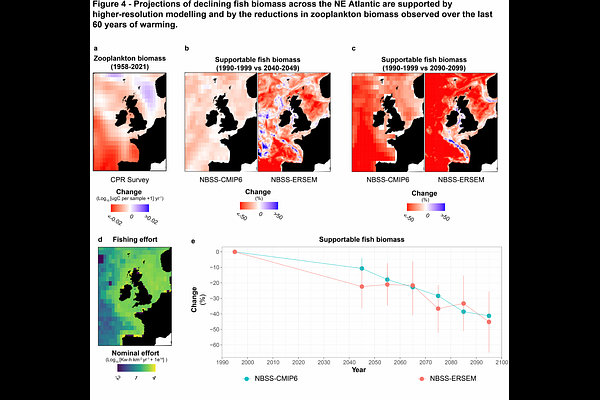Mapping global fisheries climate risks to guide sustainable marine management

Mapping global fisheries climate risks to guide sustainable marine management
Faith, M. P.; Atkinson, A.; Heneghan, R. F.; Ostle, C.; Fernandes-Salvador, J. A.; Thompson, M. S. A.; Serra-Pompei, C.; Artioli, Y.; Schmidt, K.; Rees, S.; Holland, M.; McQuatters-Gollop, A.
AbstractOcean warming is projected to threaten fisheries, but the extent varies greatly between models due to a poor understanding of how complex food webs respond to change. Likewise, inequalities in socioeconomic dependence on fisheries and uneven distributions of global fishing effort make it unclear how the distribution of fisheries declines could translate into socioeconomic impacts. Here we developed a quantitative IPCC tripartite risk mapping approach, combining hazard (projected pelagic fish decline), exposure (present day pelagic fishing intensity), and vulnerability (national dependence on fisheries) to generate global maps of pelagic fishery climate risk. Using a direct, empirical method of projecting fish trends based on plankton size-spectra, our risk mapping approach identifies fishing grounds across Southeast Asia, western seaboards of Africa and South America and adjacent islands at highest risk. We project substantial declines (~20%) in supportable fish biomass by the end of the century under a high emission scenario, which could be reduced (to ~10%) by strong global climate mitigation measures. With climate mitigation being the only clear route to curbing declines in fisheries carrying capacity, our approach guides the spatial prioritisation of broader mitigation measures which reduce other human pressures on fish stocks, including effort control and the development of protected areas which support essential fish habitats. High-risk regions extend into Areas Beyond National Jurisdiction, highlighting the potential for the upcoming High Seas Treaty to introduce fisheries management measures which serve to offset a substantial socioeconomic risk under climate change.